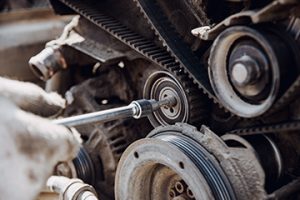Timing Belt: What It Is and Why It Matters at Meineke in Charlottesville
When you’re driving along West Main Street or heading toward Monticello, your car’s timing belt is hard at work keeping your engine running in perfect harmony. Since Charlottesville drivers face both hot summers and cold winters, this crucial part helps your engine perform smoothly in every season. Because it synchronizes your engine’s camshaft and crankshaft, it ensures your valves and pistons move at the right time — every time you drive.
At Meineke in Charlottesville, our ASE-certified technicians inspect, replace, and maintain timing belts to protect your engine from serious damage. Since a worn or broken belt can cause major internal failure, our team uses precision tools to keep your timing system in top condition. So, in this post, you’ll learn what the timing belt is, how it works, why it’s important, how to maintain it, and when to visit Meineke in Charlottesville for expert service.
What the Timing Belt Is and How It Works
Your timing belt is a reinforced rubber belt with teeth that link your engine’s crankshaft and camshaft together. Since these components control your engine’s valves and pistons, perfect synchronization is vital for combustion. Because the belt ensures they move in rhythm, it keeps your engine running quietly and efficiently. Therefore, when your timing belt works properly, your engine performs smoothly whether you’re driving through downtown Charlottesville or cruising the Blue Ridge Parkway.
Why the Timing Belt Is Important
Although it’s small, the timing belt plays a huge role in your vehicle’s performance and safety.
-
Since it synchronizes your engine’s moving parts, it prevents internal collisions.
-
Because it helps maintain proper valve timing, it improves efficiency and power.
-
As it reduces strain on other engine components, it supports long-term reliability.
-
Therefore, keeping your timing belt in top shape protects your entire engine from costly damage.
How to Maintain the Timing Belt
Routine care helps you avoid sudden failures and expensive repairs:
-
Since timing belts wear out over time, replace yours every 60,000–100,000 miles as your manufacturer recommends.
-
Because oil leaks damage rubber, fix leaks near the belt immediately.
-
As tension affects performance, have your belt’s tension checked during regular maintenance.
-
Since extreme heat shortens lifespan, inspect your belt more often during Charlottesville’s summer months.
-
Because preventive care saves money, schedule a belt inspection at Meineke in Charlottesville during each major service.
When to See a Mechanic in Charlottesville
Visit Meineke in Charlottesville if you notice these signs your timing belt may need attention:

So, Call Meineke in Charlottesville Today for a Quick Check-Up
Your timing belt keeps your engine running in perfect rhythm, mile after mile. Since a broken belt can cause serious and costly damage, replacing it before it fails is one of the smartest maintenance choices you can make. Because our ASE-certified team at Meineke in Charlottesville specializes in timing belt inspections and replacements, you can always count on expert care and peace of mind.
So, call Meineke in Charlottesville today for a quick check-up and keep your timing belt — and your engine — running strong and synchronized on every drive.

